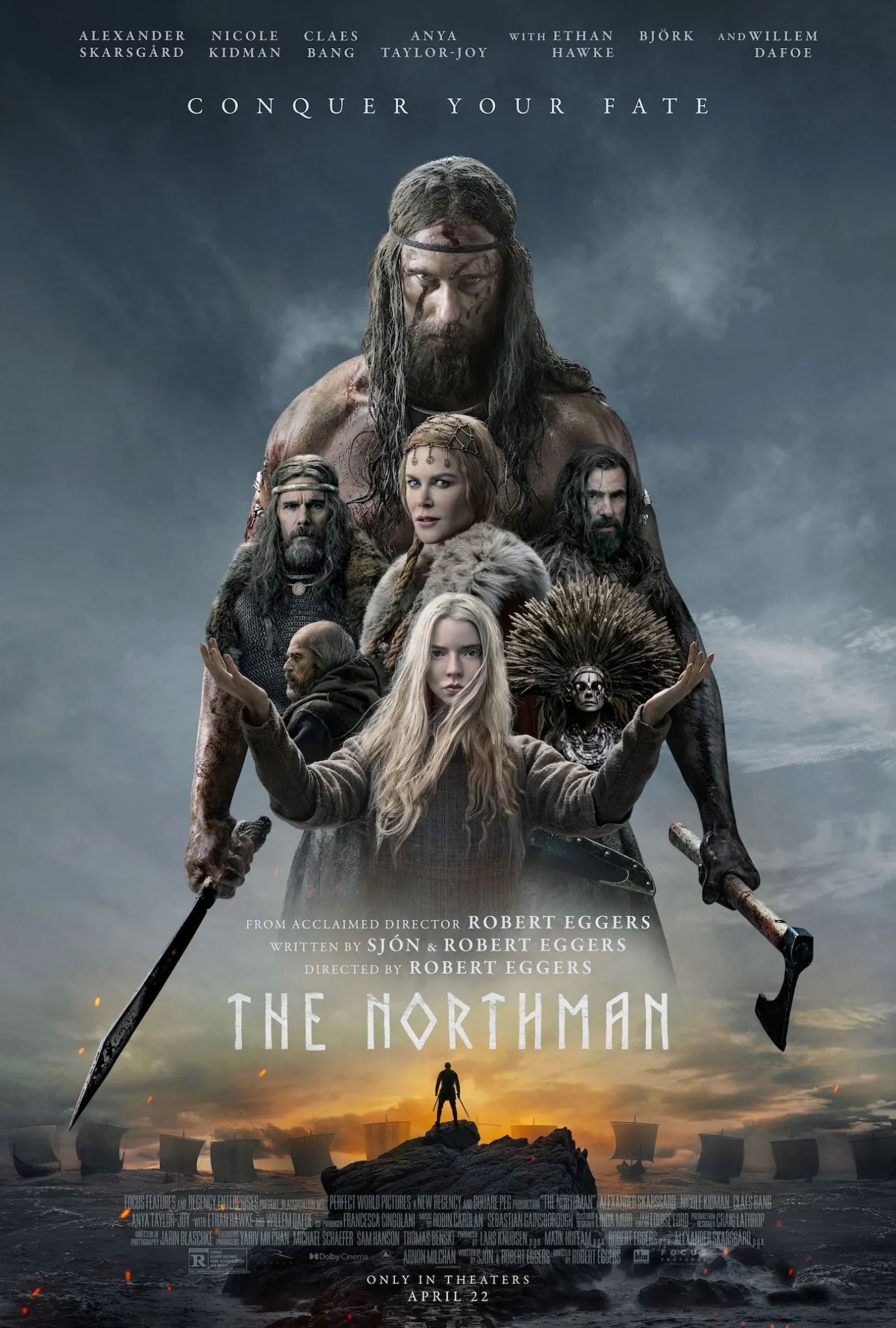
21 Apr The Northman Review
THE NORTHMAN
The Northman, the latest offering from Focus Features, is centered on Prince Amleth, a boy on the verge of becoming a man when his father the king is ambushed and murdered by his uncle Fjölnir. While Amleth narrowly escapes, Fjölnir kidnaps Amleth’s mother to claim as his own. 20 years later, now a Viking that raids Slavic villages, Amleth meets a sorceress that reminds him of his vow of vengeance to honor his father, kill his uncle, and save his mother.
Directed by Robert Eggers, The Northman marks his third official outing in feature length filmmaking, and he’s already established a presence. Not suffering a sophomore slump with The Lighthouse, Eggers’ momentum continues to grow. Each film vastly different from the one before it, he’s managed to keep his fans off balance at every turn, refusing to settle into one particular type of genre or story. Here in The Northman, Eggers’ tilt at a vengeance film hits more highs than it does lows. Coaxing masterful performances, especially from Nicole Kidman, Eggers attempts at monumental storytelling are ultimately hindered by a lack of character development or relationship building. In his attempts to go big, he either forgets or neglects to focus on the smaller elements that make for great storytelling. The best relationship in the film, the one between young Amleth and his father King Aurvandill War-Raven, is all too brief as Aurvandill’s murder at the hands of his brother happens soon after the opening credits, abandoning the finest pairing of the film’s characters in favor of plot progression. What should be the best relationship in the movie, the pairing of older Amleth and Olga of the Birch Forest, comes in fits and spurts. Fleeting moments to converse between the two leads to a relationship that seems to be one more borne of common cause than actual love.
Still, make no mistake: The Northman is all about scope. An epic movie, with epic landscapes and an epic third act showdown reminiscent of Star Wars Episode III: Revenge of the Sith, Eggers is working on a scale hitherto unforeseen in his career. While The VVich is about a family ostracized and isolated from society and The Lighthouse is focused on two men stranded on a remote island, The Northman has more characters and more speaking roles than both films combined and doubled. Using the remarkable Irish landscape to depict a world as yet untouched by the ravages of human progress, cinematographer Jarin Blaschke (who also shot The VVitch and The Lighthouse) is able to transport the audience back in time and into a world that no modern person would survive. The unflinching brutality between warring clans and unapologetic display of violence is balanced by the fact that while many a limb are hacked off and intestine spilled, there is surprisingly little amount of blood shown. While it’s not a film for the children, it shows a curious aspect of restraint that Eggers seems to want to lean into the violence and barbarism that come with both the time period and with revenge films in general, but yet fall just short of showing the viscera in full display.
For all its crude action, the overarching theme of the film is a simple one: vengeance is futile. Whether it’s a righteous quest (Kill Bill) or a thirst to correct a perceived slight (Star Trek II: The Wrath of Khan), the idea of righting a wrong is the common key found within the subgenre. While each of these films handle vengeance in different ways, be it triumphant success or melancholic acceptance of fate, The Northman’s clear condemnation of it is a mainstream rarity. Usually reserved for smaller, character driven pieces that largely go overlooked by the general audience, the theory that vengeance ultimately leads nowhere or that violence only begats more violence is a key component of the film. Eggers and co-writer Sjon do an excellent job weaving these ideals throughout Amleth’s rage-fueled quest to seek just for his father.
Starring Alexander Skarsgård as Amleth, The Northman is a movie that seems suited to the Swedish actor’s 6-foot-4-inch frame. As the titular vengeful Viking, the film gives Skarsgård plenty of time on screen, but light on dialogue. As a man of few words, Amleth plays up the trope of the stoic obsessively focused hero reminiscent of 1980s action heroes. While those tropes were used effectively back then as an easy way to get around the somewhat limited acting capability of its main stars, we’ve seen Skarsgård play engaging, charming characters before. It’s a shame we get to see little of that in The Northman; once Amleth is set on his goal, his laser focus is his main asset. To that end, Skarsgård is delightful as the brooding hero. His physicality, his ability to pivot from sullen to ferocious at the flip of a switch, as well as his tenderness in his scene with Anya Taylor-Joy show that Skarsgård has all the ability of a leading man.
Unfortunately, the person who suffers the most in the film is Anya Taylor-Joy as Olga of the Birch Forest, a Slavic sorceress. Not appearing until some 40-something minutes into the film, Taylor-Joy’s chemistry with Skarsgård is believable, more as a partner in crime than as a viable love interest for Skarsgård. This is due to either the film’s writing or editing; the two don’t have enough scenes together (and the scenes they do have aren’t very long) to build the rapport of two hardscrabble lovers. While Amleth is the film’s main focus, Olga doesn’t have enough screen time to make her presence fully felt. As a sorceress, we’re only treated to one full on display of her abilities, but this may be Eggers attempting to stay as grounded to realism as possible within the world he built. Still, Taylor-Joy is always a delight when on screen and hopefully, this second collaboration between her and Eggers leads to many more.
Claes Bang provides possibly the most interesting and nuanced performance of the film. Painted broadly as the antagonist in which Amleth quests to exact revenge upon, Bang’s Uncle Fjölnir is far from a cackling, gleefully violent one dimensional character. Eggers and Sjon take pains to flesh out Fjölnir as more than just a target for Amleth’s sword. Some of the best antagonists in fiction are the ones who fully believe their cause is the right and just one, and Bang turns in a solid performance as a man presented as one thing, and revealed as another.
The real standout of the movie, as far as acting, has to be Nicole Kidman. Seen at the beginning of the movie as Queen Gudrún, Amleth’s mother stolen and whisked away by Fjölnir and reappearing sporadically about halfway through, Kidman uses her intermittent moments on screen to remind us why she’s an Academy Award winning actress. The depth and levels with which Kidman mines Gudrún is sublime to see play out on screen. Culminating in a confrontation between Gudrún and Amleth that is sure to leave some squirming in their seats, Kidman’s performance shifts the story away from Hamlet (which was inspired by this story) and almost into Macbeth territory.
With The Northman, director Robert Eggers and his team take their first real foray into action. Having curated two slower, quieter, character driven stories, this film shows that the young director is capable of handling both blockbuster styled action as well as smaller, more intimate fights. Coupled with Blashke’s dynamic camera and Eggers’ decision to shoot in longer takes, the action feels more real and grounded to story. Devoid of any flashy swordplay that could be construed as more choreography than savagery, Amleth hacks, batters, and slashes his way through his opponents. The decision to have Amleth and Olga play mental games with their enemy in combination with Amelth’s sword is both a gift and a curse of the film. On the positive side, it gives Olga’s character purpose; pulling her weight in their fate as the brains that serves to bolster Amleth’s brawn is a distinctly purposeful decision in showing that quests like these need not always be affairs that leave the protagonists soaked to the elbows in blood. Unfortunately, it also hampers the film’s pacing; the cross play between Amleth’s action and his decisions to fall back to let Olga work her witchcraft, while a formidable combination, makes the film feel stilted. It begs the question of why, when Amleth is seemingly unbeatable in combat, would he bother to pause to mentally torture his foes? It draws the movie out for an unnecessary amount of time and while the combination of brute strength and guile works, at times it makes the 137 minutes feel like 137 minutes.
The film’s production, both in sets and costumes deserves praise as well. Creating a muddy, flea bitten, and overall filth ridden world that does little to attempt to glamorize the period or view the Vikings through rose-tinted glasses, the audience can almost feel the need to shower after watching the movie. Teeming with sweaty, greasy men, often slick with either their own blood, or the blood of someone else rubbed in their face, all the technical crews produced a grungy, bleak world mostly devoid of any real joy or cause for celebration, a continued aesthetic throughout Eggers’ films.
Overall, while not without its flaws, The Northman is an epic revenge film in every sense of the phrase. Arresting visual images, a grandiose scope of story, and strong performances make this film Robert Eggers’ biggest swing for the fences yet. Eggers’ respect and fascination for the Vikikng culture shines as he digs into Nordic mythology and creates a savagely brutal world dominated by those who take. While the development between characters suffers for this world building, the passion the director and his team put into the saga is undeniable. Even with these character and pacing issues, the overall experience is one of ambition and awe. The Northman is currently in theaters.
Review by Darryl Mansel


No Comments